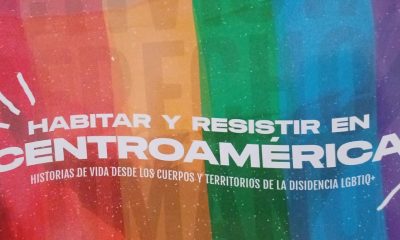News
Grupos LGBTI de El Salvador preocupados ante caravanas de migrantes
Organización trans emitió aviso el pasado mes
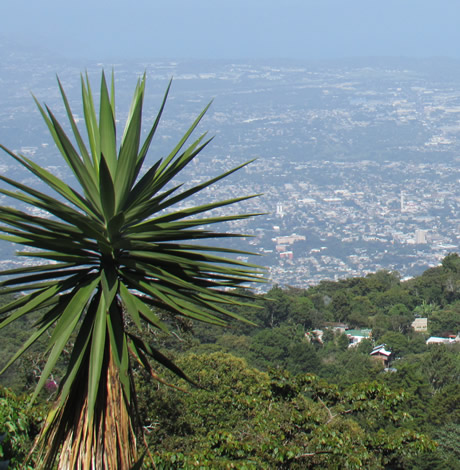
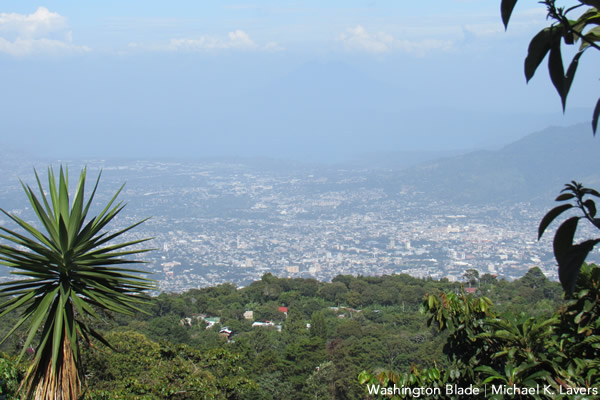
Grupos LGBTI en El Salvador han expresado su preocupación sobre los caravanas de migrantes. (Foto del Washington Blade por Michael K. Lavers)
“Ponte de acuerdo con las personas que participarán de esta caravana,” fue el mensaje que la página de Facebook publicó el 24 de octubre. “Comenta de dónde eres para que los demás sepan y sea más fácil para todos llegar en grupos.”
“Hay gente de todo el país,” añadió. “El Salvador emigra por un futuro mejor.”
Dicha página entró en funciones desde el 16 de octubre, administrada por una persona sin identificarse. Alenta a personas que querían salir del país a crear y unirse a grupos de redes sociales para enterarse así de los grupos cercanos que se unirían a dicha caravana y así salir con ellos.
Esta situación comenzó a preocupar a diferentes personas y organizaciones de la sociedad civil, entre ellas las organizaciones LGBTI que conforman la Federación Salvadoreña LGBTI. COMCAVIS Trans tomó la iniciativa de publicar un aviso de advertencia para la población LGBTI.
“MIGRAR es un DERECHO pero hacerlo de forma irregular implica riesgos altos, especialmente para las personas LGBTI,” lea el aviso de COMCAVIS Trans en su página de Facebook.
“Algunas de las personas LGBTI viajan por mejorar sus condiciones económicas, ya que en El Salvador existe una discriminación evidente al acceso de trabajo para muchas de las personas LGBTI, especialmente para las mujeres transgénero, existe mucha inseguridad a su integridad física, asedio por pandillas, tratos crueles y abuso de autoridad por parte de policías, soldados,” comenta al Washington Blade Bianca Rodríguez, directora ejecutiva de COMCAVIS Trans.
Entre los enunciados del aviso mencionaban que ser una persona LGBTI no es garantía de recibir y/o refugio en los EEUU, a la vez hacían énfasis que el gobierno estadounidense ha lanzado una advertencia para todas las personas que entren de manera irregular, que serán detenidas y procesadas judicialmente para su deportación.
Por otro lado, Liduvina Magarin, viceministra del Ministerio de Relaciones Exteriores, declaró que brindarían “acompañamiento” al grupo de salvadoreños migrantes, con el único objetivo de que las familias salvadoreñas se informen, tomen una decisión responsable y no pongan en riesgo la vida de los niños y niñas en la ruta migratoria.
Pero el 31 de octubre se concentró otro número de personas en el mismo lugar para conformar una segunda caravana, con el mismo objetivo de buscar un futuro mejor para sus familias.
“Si normalmente corremos peligro en nuestro diario vivir, en las caravanas de arriesga el triple y no solo son o serán violentados en las fronteras por las autoridades o la delincuencia, sino también por los mismos que forman las caravanas,” comentó al Blade Aldo Peña de Hombres Trans HT.
“Yo no me iría para posiblemente morir en el camino, además que recuerden que en este país dejan a sus familias, y ellos seguirán viviendo las injusticias de este país,” agrega Peña.
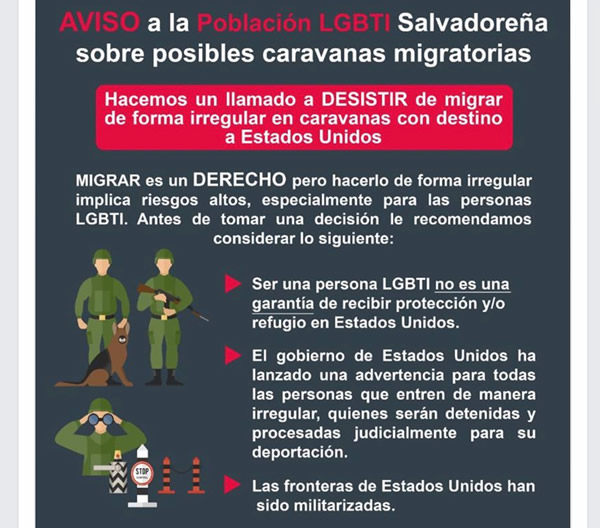
COMCAVIS Trans ha emitido un aviso que insta a los migrantes LGBTI a no viajan a los EEUU con caravanas de migrantes.
Por su parte Camila Portillo, una activista trans, comenta al Blade que “no hay que detener el sueño de emigrar por un mejor futuro, si por ejemplo el Estado y el país no garantiza el desarrollo socio económico de la población LGBTI.”
“Práctica no se ejecutan de la forma correcta, aunque hayan personas en la disposición de apoyar a las personas LGBTI,” ella dijo.
“Acá hay mucho desplazamiento forzado internamente, por el tema de la violencia, así que no creo que sea una moda,” Portillo comenta al Blade. “Es más que todo una cuestión estructural de que el Estado no garantiza no solo a la población LGBTI sino a la población en general, pero que por ser una población en riesgo es más vulnerada, por eso el estado debe garantizar el bienestar de las personas.”
Portillo no pierde la esperanza que en los países donde pasen las caravanas logren tener la ayuda que necesitan y poder cumplir sus objetivos sin tener muchos obstáculos, que el Estado salvadoreño debe comenzar a depurar sus mismas estructuras llenas de corrupción, que hacen valer decretos y diferentes lineamientos que se han creado a favor de la población LGBTI, no solo tener todo por escrito, sino comenzar a ejecutarlo.
En la Declaración Universal de los Derechos Humanos en sus artículos 13 y 14 reivindica expresa que las personas tienen derecho a moverse libremente e incluso a buscar refugio y asilo en casos extremos donde su vida corre peligro.
“Ante los altos índices de violencia en El Salvador muchas de las personas que integran esa caravana tendrán sus propios motivos para migrar,” expresó Rodríguez. “Pero ante esta situación el Estado salvadoreño por lo menos debería coordinar con instituciones nacionales y asociaciones y organismos internacionales para brindar una protección durante su recorrido, que incluso los países que ellos transitan hacia EEUU (Guatemala, México) proteja sus derechos humanos.”
Al cierre de esta nota las personas de la primera caravana ya se encontraban en tierras mexicanas, en donde se les dio albergue a las familias para que pudieran mantenerse juntas. También recibieron asistencia médica, alimentos, baños y regaderas.
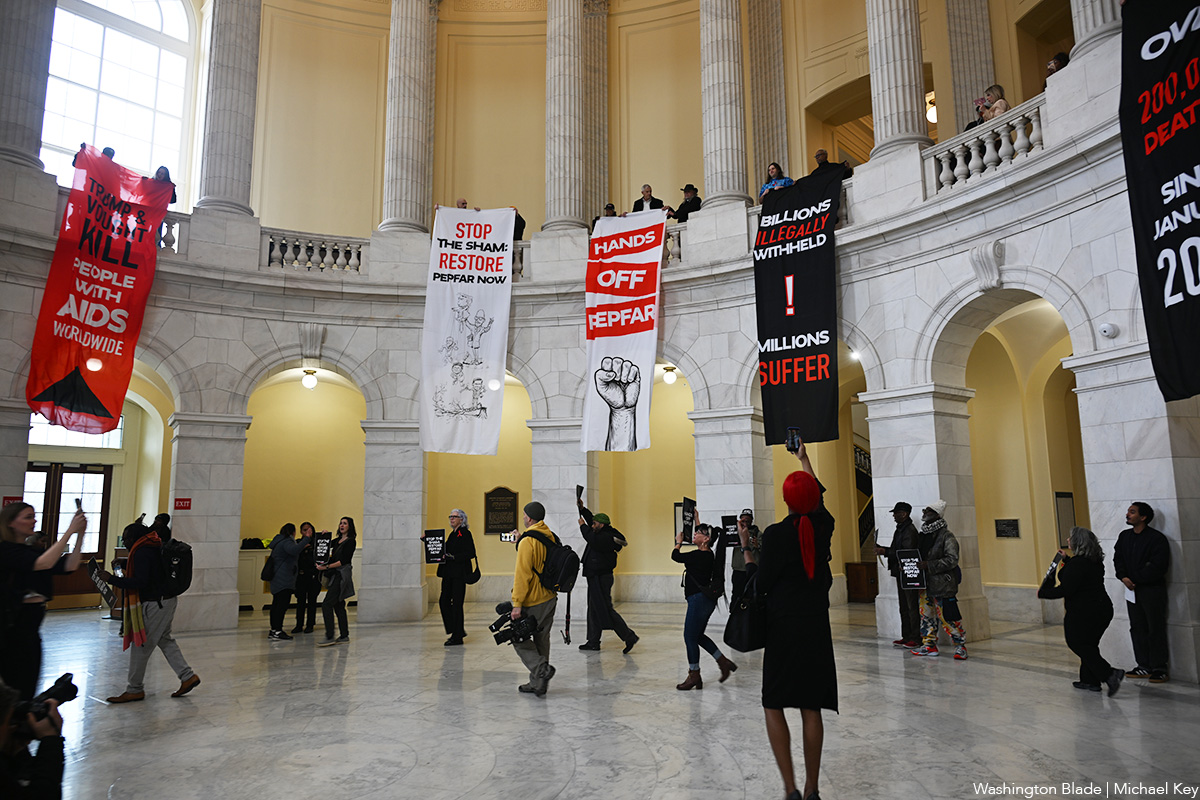
U.S. Capitol Police on Thursday arrested 13 HIV/AIDS activists in the Cannon House Office Building Rotunda.
The activists — members of Housing Works, Health GAP, and the Treatment Action Group — joined former PEPFAR staffers in demanding full funding of the program that President George W. Bush created in 2003. They chanted “AIDS cuts kill, PEPFAR now!” and unfurled banners from the Rotunda’s second floor that read “Trump and (Office of Management and Budget Director Russell) Vought kill people with AIDS worldwide,” “Over 200,000 deaths since January 2025,” and “Hands off PEPFAR” before their arrest.
(Washington Blade video by Michael K. Lavers)
This protest is the latest against the Trump-Vance administration’s HIV/AIDS policies since it took office.
Secretary of State Marco Rubio on Jan. 28, 2025, issued a waiver that allowed PEPFAR and other “life-saving humanitarian assistance” programs to continue to operate during a freeze on nearly all U.S. foreign aid spending. HIV/AIDS service providers around the world with whom the Washington Blade has spoken say PEPFAR cuts and the loss of funding from the U.S. Agency for International Development, which officially closed on July 1, 2025, has severely impacted their work.
The State Department last September announced PEPFAR will distribute lenacapavir in countries with high prevalence rates. Zambia is among the nations in which the breakthrough HIV prevention drug has arrived.
The New York Times last summer reported Vought “apportioned” only $2.9 billion of $6 billion that Congress set aside for PEPFAR for fiscal year 2025. (PEPFAR in the coming fiscal year will use funds allocated in fiscal year 2024.)
Bipartisan opposition in the U.S. Senate prompted the Trump-Vance administration last July withdraw a proposal to cut $400 million from PEPFAR’s budget. Vought on Aug. 29, 2025, said he would use a “pocket rescission” to cancel $4.9 billion for HIV/AIDS prevention and global health programs and other foreign aid assistance initiatives that Congress had already approved.
The White House in January announced an expansion of the global gag rule to ban U.S. foreign aid for groups that promote “gender ideology.” President Ronald Reagan in 1985 implemented the original regulation, also known as the “Mexico City” policy, which bans U.S. foreign aid for groups that support abortion and/or offer abortion-related services. The Council for Global Equality and other groups say the expanded rule will adversely impact HIV prevention efforts around the world.
A press release that Housing Works and Health GAP issued on Thursday notes more than $977 million “in appropriated PEPFAR funding for HIV prevention and treatment was unspent by the end of fiscal year (FY) 2025 — triple amount unspent at the end of FY 2024.”
“Activists predict this backlog will worsen rapidly in FY 2026 unless Congress immediately reasserts its Constitutionally-mandated oversight authority,” notes the press release.
The press release also indicates funding for the Centers for Disease Control and Prevention’s PEPFAR programs “will run out” by April 1 because “only 45 percent of their FY26 funding has been transferred from the State Department.
“Unless funding is transferred immediately, CDC’s global HIV programs across sub-Saharan Africa, Asia and the Caribbean will grind to a halt,” notes the press release.
The activists demanded Trump, Vought, Rubio, and Congress do the following:
- Activists are calling for full obligation of appropriated PEPFAR funds and rejection of growing political interference in global and domestic HIV programs
- Immediately release already-appropriated, unobligated PEPFAR funds
- Break the blackout on PEPFAR data, so Congress and people with HIV know how funding is being spent and can program based on data
- Activists are calling for full obligation of appropriated PEPFAR funds and rejection of growing political interference in global and domestic HIV programs.
“PEPFAR has saved more than 26 million lives and changed the trajectory of an epidemic,” said Housing Works CEO Charles King. “However, the Trump administration’s decision, over the objection of Republicans in Congress, to freeze PEPFAR funding has caused decades of progress to come undone and has been a death sentence for people with HIV relying on life-saving treatment. The U.S. must immediately restore PEPFAR funding and regain our standing in the global fight against HIV.”
King is among the activists who were arrested.
(Washington Blade video by Michael K. Lavers)

Texas state Rep. James Talarico won a hard-fought primary Tuesday to become the state’s Democratic nominee for U.S. Senate, defeating U.S. Rep. Jasmine Crockett in one of the year’s most closely watched and competitive Democratic contests.
Talarico, a Presbyterian seminarian and three-term lawmaker from Round Rock, was declared the winner by the Associated Press early Wednesday morning after a closely tracked vote count that drew national attention.
“Tonight, the people of our state gave this country a little bit of hope,” Talarico told the AP. “And a little bit of hope is a dangerous thing.”
With 52.8% of the vote to Crockett’s 45.9%, Talarico secured the nomination outright, avoiding a runoff and capping months of sharp contrasts between the two candidates over strategy, messaging, and how best to compete statewide in Texas. Democrats hope the competitive primary — and the relatively narrow margin — signals growing momentum in a state that has not elected a Democrat to the U.S. Senate since 1988.
Talarico has long expressed support for the LGBTQ community, a position he highlights prominently on his campaign website. Under the “Issues” section, he directly addresses assumptions that might arise from his faith and background as a seminarian in a deeply conservative state.
“My faith in Jesus leads me to reject Christian Nationalism and commit myself to the project of democracy,” his website reads. “Because that’s the promise of America: a democracy where every person and every family — regardless of religion, race, gender, sexual orientation, or any other difference between us — can truly be free and live up to their full potential.”
Crockett struck a conciliatory tone following her defeat, emphasizing party unity ahead of November.
“This morning I called James and congratulated him on becoming the Senate nominee,” Crockett told Politico. “Texas is primed to turn blue and we must remain united because this is bigger than any one person. This is about the future of all 30 million Texans and getting America back on track.”
Talarico also drew national attention earlier in the race when “Late Show” host Stephen Colbert said he was initially unable to air an interview with the state legislator due to potential FCC concerns involving CBS. The episode sparked a broader political debate.
Brendan Carr, chair of the Federal Communications Commission, appointed by President Donald Trump, told reporters the controversy was a “hoax,” though he also acknowledged Talarico’s ability to harness the moment to build support as an underdog candidate. The interview was later released online and garnered millions of views, boosting Talarico’s national profile.
In November, Talarico will face the winner of the Republican primary between incumbent Sen. John Cornyn and Texas Attorney General Ken Paxton, who have been locked in a bruising GOP contest. Rep. Wesley Hunt was also in the Republican primary field. The GOP race is expected to head to a May runoff.
In a joint statement, Senate Minority Leader Chuck Schumer and Democratic Senatorial Campaign Committee Chair Kirsten Gillibrand praised Talarico’s victory and framed him as a candidate capable of broad appeal.
“As an eighth-generation Texan, former middle school teacher, and Presbyterian seminarian, James will be a fighter for Texans from all walks of life and of all political stripes,” they said. “In November, Texans will elect a champion for working people: James Talarico.”
Maryland
Md. Commission on LGBTQIA+ Affairs released updated student recommendations
LGBTQ students report higher rates of bullying, suicide

The Maryland Commission on LGBTQIA+ Affairs has released updated recommendations on how the state’s schools can support LGBTQ students.
The updated 16-page document outlines eight “actionable recommendations” for Maryland schools, supplemented with data and links to additional resources. The recommendations are:
- Developing and passing a uniform statewide and comprehensive policy aimed at protecting “transgender, nonbinary, and gender expansive students” against discrimination. The recommendation lists minimum requirements for the policy to address: name, pronoun usage, and restroom access.
- Requiring all educators to receive training about the specific needs of LGBTQ students, by trained facilitators. The training’s “core competencies” include instruction on terminology, data, and support for students.
- Implementing LGBTQ-inclusive curricula and preventing book bans. The report highlights a “comprehensive sexual education curriculum” as specifically important in the overall education curriculum. It also states the curriculum will “provide all students with life-saving information about how to protect themselves and others in sexual and romantic situations.”
- Establishing Gender Sexuality Alliances “at all schools and in all grade levels.” This recommendation includes measures on how to adequately establish effective GSAs, such as campaign advertising, and official state resources that outline how to establish and maintain a GSA.
- Providing resources to students’ family members and supporters. This recommendation proposes partnering with local education agencies to provide “culturally responsive, LGBTQIA+ affirming family engagement initiatives.”
- Collecting statewide data on LGBTQ youth. The data on Maryland’s LGBTQ youth population is sparse and non-exhaustive, and this recommendation seeks to collect information to inform policy and programming across the state for LGBTQ youth.
- Hiring a full-time team at the Maryland Department of Education that focuses on LGBTQ student achievement. These employees would have specific duties that include “advising on local and state, and federal policy” as well as developing the LGBTQ curriculum, and organizing the data and family resources.
- Promoting and ensuring awareness of the 2024 guidelines to support LGBTQ students.
The commission has 21 members, with elections every year, and open volunteer positions. It was created in 2021 and amended in 2023 to add more members.
The Governor’s Office of Communication says the commission’s goal is “to serve LGBTQIA+ Marylanders by galvanizing community voices, researching and addressing challenges, and advocating for policies to advance equity and inclusion.”
The commission is tasked with coming up with yearly recommendations. This year’s aim “to ensure that every child can learn in a safe, inclusive, and supportive environment.”
The Human Rights Campaign’s most recent report on LGBTQ youth revealed that 46.1 percent of LGBTQ youth felt unsafe in some school settings. Those numbers are higher for transgender students, with 54.9 percent of them saying they feel unsafe in school.
Maryland’s High School Youth Risk Behavior Survey reveals a disparity in mental health issues and concerns among students who identify as LGBTQ, compared to those who are heterosexual. LGBTQ students report higher rates of bullying, feelings of hopelessness, and suicidal thoughts. Nearly 36 percent of LGBTQ students report they have a suicide plan, and 26.7 percent of respondents say they have attempted to die by suicide.
The commission’s recommendations seek to combat the mental health crisis among the state’s LGBTQ students. They are also a call for local and state governments to work towards implementing them.

